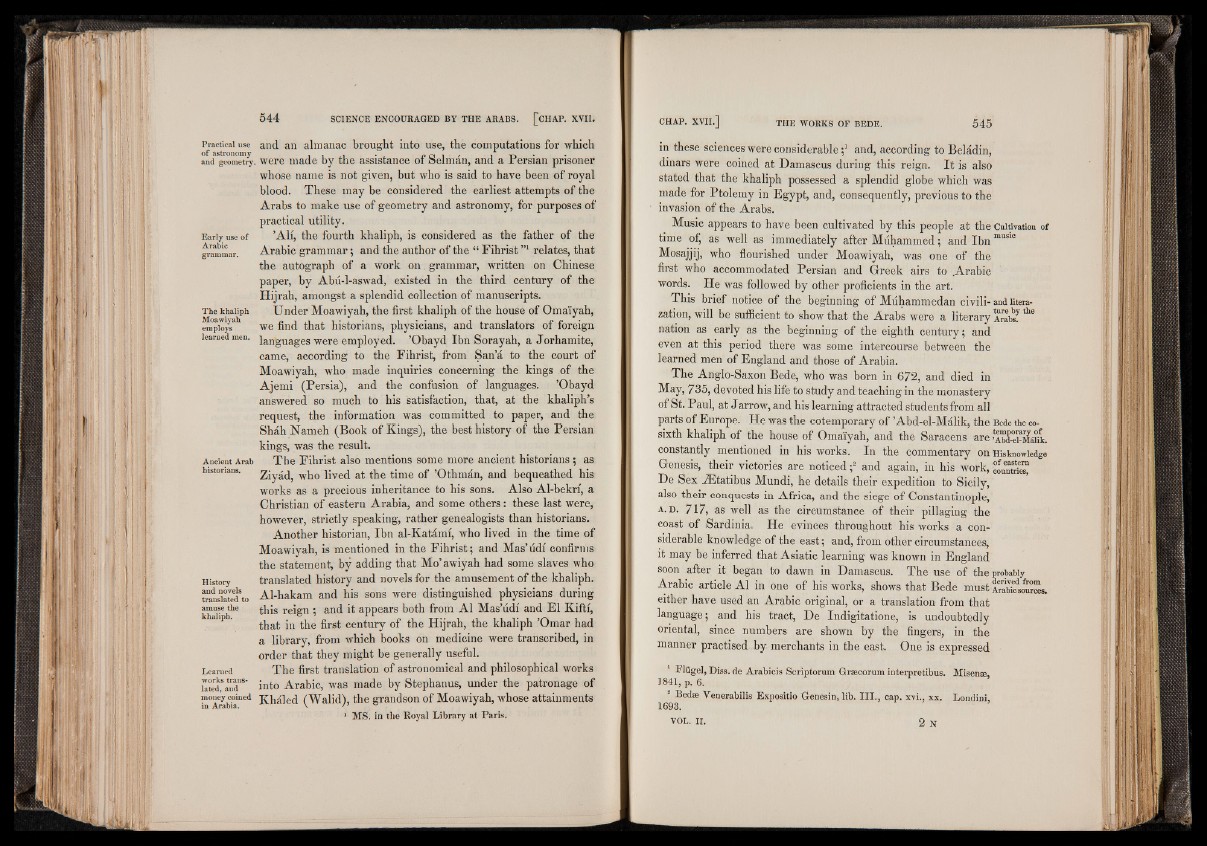
Practical use
of astronomy
and geometry.
Early use of
Arabic
grammar.
The khaliph
Moawiyah
employs
learned men.
Ancient Arab
historians.
History
and novels
translated to
amuse the
khaliph.
Learned
works translated,
and
money coined
in Arabia.
and an almanac brought into use, the computations for which
were made by the assistance of Selman, and a Persian prisoner
whose name is not given, but who is said to have been of royal
blood. These may be considered the earliest attempts of the
Arabs to make use of geometry and astronomy, for purposes of
practical utility.
’Adi, the fourth khaliph, is considered as the father of the
Arabic grammar; and the author of the “ Fihrist r’1 relates, that
the autograph of a work on. grammar, written on Chinese
paper, by Abu-l-aswad, existed in the third century of the
Hijrah, amongst a splendid collection of manuscripts.
Under Moawiyah, the first khaliph of the house of Omaiyah,
we find that historians, physicians, and translators of foreign
languages were employed. ’Obayd Ibn Sorayah, a Jorhamite,
came, according to the Fihrist, from San’a to the court of
Moawiyah, who made inquiries concerning the kings of the
Ajemi (Persia), and the confusion of languages. ’Obayd
answered so much to his satisfaction, that, at the khaliph’s
request, the information was committed to paper, and the
Shah Nameh (Book of Kings), the best history of the Persian
kings, was the result.
The Fihrist also mentions some more ancient historians ; as
Ziyad, who lived at the time of ’Othman, and bequeathed his
works as a precious inheritance to his sons. Also Al-bekri, a
Christian of eastern Arabia, and some others: these last were,
however, strictly speaking, rather genealogists than historians.
Another historian, Ibn al-Katami, who lived in the time of
Moawiyah, is mentioned in the Fihrist; and Mas’udi confirms
the statement, by adding tbat Mo’awiyah had some slaves who
translated history and novels for the amusement of the khaliph.
Al-hakam and his sons were distinguished physicians during
this reign; and it appears both from A1 Mas’udi and El Kifti,
that in the first century of the Hijrah, the khaliph ’Omar had
a library, from which books on medicine were transcribed, in
order tbat they might be generally useful.
The first translation of astronomical and philosophical works
into Arabic, was made by Stephanus, under the patronage of
Khaled (Walid), the grandson of Moawiyah, whose attainments
1 MS. in the Royal Library at Paris.
in these sciences were considerable;1 and, according toBelàdin,
dinars were coined at Damascus during this reign. It is also
stated that the khaliph possessed a splendid globe which was
made for Ptolemy in Egypt, and, consequently, previous to the
invasion of the Arabs.
Music appears to have been cultivated by this people at the Cultivation of
time of, as well as immediately after Muhammed ; and Ibn muS10
Mosajjij, who flourished under Moawiyah, was one of the
first who accommodated Persian and Greek airs to Arabic
words. He was followed by other proficients in the art.
This brief notice of the beginning of Muhammedan civili- and litera-
zation, will be sufficient to show that the Arabs were a literary Arabsf Ìtf
nation as early as the beginning of the eighth century; and
even at this period there was some intercourse between the
learned men of England and those of Arabia.
The Anglo-Saxon Bede, who was born in 672, and died in
May, 735, devoted his life to study and teaching in the monastery
of St. Paul, at Jarrow, and his learning attracted students from all
parts of Europe. He was the cotemporary of ’Abd-el-Malik, the Bede the cosixth
khaliph of the house of Omaiyah, and the Saracens are ’amS-maiìL
constantly mentioned in his works. In the commentary on Hisknowiedge
Genesis, their victories are noticed f and again, in his work, “ouiSe™
De Sex ZEtatibus Mundi, he details their expedition to Sicily,
also their conquests in Africa, and the siege of Constantinople,
a . d . 717, as well as the circumstance of their pillaging the
coast of Sardinia. He evinces throughout his works a considerable
knowledge of the east ; and, from other circumstances,
it may be inferred that Asiatic learning was known in England
soon after it began to dawn in Damascus. The use of the probably
Arabic article Al in one of his works, shows that Bede must A rab b s^S s.
either have used an Arabic original, or a translation from that
language; and his tract, De Indigitatione, is undoubtedly
oriental, since numbers are shown by the fingers, in the
manner practised by merchants in the east. One is expressed
1 Flugel, Diss. de Arabicis Scriptorum Graecorum interpretibus. Misenae
1841, p. 6.
2 Bedse Venerabilis Expositio Genesin, lib. I I I ., cap. xvi., xx. Londini
1693.
VOL. II . 2 N